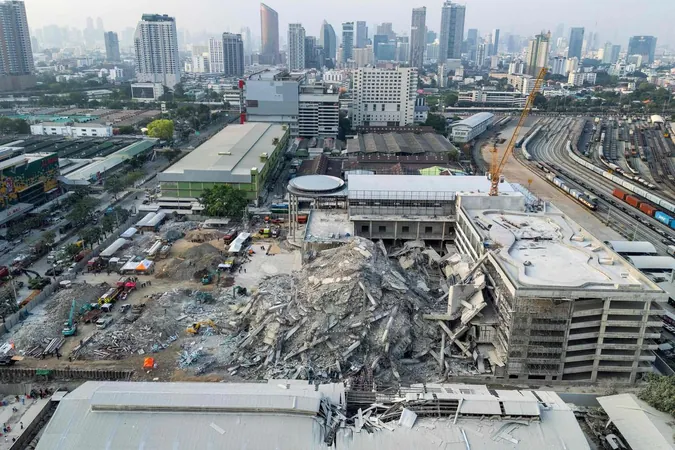
Controversy Erupts Over Collapsed Bangkok Skyscraper as Chinese Contractor Faces Scrutiny
2025-03-31
Author: John Tan
Introduction
In an alarming turn of events, the construction of a Bangkok skyscraper, promoted as a landmark achievement by the China Railway No. 10 Engineering Group, has ended in disaster. The building, which was to house the Thai government's state audit office, collapsed shortly after a powerful 7.7-magnitude earthquake struck the region on March 28, 2024. At the time of the collapse, over 100 individuals were reportedly working on-site.
Promotional Campaign and Safety Concerns
Promotional videos from the Chinese contractor, showcased on social media in early 2024, proudly displayed the building’s impressive height and modern design, positioning it as China's first overseas super high-rise "calling card." However, in the wake of the disaster, these promotional materials were swiftly removed from their platforms, raising suspicions and concerns about the project's safety and the quality of construction.
Impact of the Earthquake and Casualties
This tragic incident is compounded by the fact that the earthquake's epicenter was actually located in neighboring Myanmar, where the death toll has sadly surpassed 2,000. Nonetheless, the dramatic footage of the crumbling skyscraper in Bangkok has shocked the public and ignited a wave of outrage and scrutiny regarding construction standards and practices in Thailand.
Casualties and Rescue Operations
The collapse has claimed 12 lives thus far, with around 75 individuals still unaccounted for as rescue operations continue. The media has raised significant questions regarding the oversight of the construction process and the awarding of contracts, especially as this building is the only one in the metropolis to suffer a complete collapse during the earthquake.
Joint Venture and Public Discontent
Interestingly, the China Railway No. 10 Engineering Group is in a joint venture with the Italian-Thai Development (ITD) company, where the former holds a 49% stake—the maximum allowed for foreign ownership under Thai law. This has sparked public discontent, particularly amid a backdrop of increasing Chinese investment in Thailand. Many observers are drawing parallels to previous contracts awarded to Chinese firms, especially during the tenure of former Prime Minister General Prayut Chan-o-cha.
Chinese Investment in Thailand
China has emerged as a dominant force in foreign direct investment in Thailand, representing a quarter of total investments in 2023. Projects under China's Belt and Road Initiative have led to significant infrastructural developments, which has been a source of both progress and criticism.
Political Ramifications
Moreover, the collapse coincided with Thailand's recent controversial decision to deport 40 Uighurs to China, which has raised alarms among human rights advocates. Critics argue that this could exacerbate the already tense relations between the two nations.
Government Response and Investigations
In response to the tragic events, Prime Minister Paetongtarn Shinawatra has ordered an expert committee to investigate the causes of the collapse. She expressed concern over why this particular structure had failed while others remained standing, emphasizing the commitment to uncovering the truth.
Quality of Construction Materials
Investigators from the Ministry of Industry are examining the quality of construction materials used, focusing particularly on the steel bars thought to be crucial for the building's integrity. Furthermore, four Chinese nationals have been detained for allegedly attempting to remove sensitive documents from the disaster site, prompting legal action.
Corporate Accountability
Despite the gravity of the situation, China Railway No. 10 and its parent company have yet to respond publicly to the crisis. Meanwhile, ITD has expressed its condolences to the families of the victims and committed to aiding in recovery efforts, but skepticism remains about the accountability of the companies involved.
Public Sentiment and Future Implications
Prominent journalist Pravit Rojanaphruk has called for deeper cooperation from the Chinese government in the investigation, warning that perceived indifference could lead to rising anti-Chinese sentiments within Thailand.
Conclusion
As the search for the missing continues and authorities work to piece together what went wrong, the aftermath of this disaster poses pressing questions about safety regulations, foreign investment, and the future of major projects in Thailand. What will it take for accountability and reforms to ensure that such catastrophes never happen again? The nation watches closely as this story develops.


 Brasil (PT)
Brasil (PT)
 Canada (EN)
Canada (EN)
 Chile (ES)
Chile (ES)
 Česko (CS)
Česko (CS)
 대한민국 (KO)
대한민국 (KO)
 España (ES)
España (ES)
 France (FR)
France (FR)
 Hong Kong (EN)
Hong Kong (EN)
 Italia (IT)
Italia (IT)
 日本 (JA)
日本 (JA)
 Magyarország (HU)
Magyarország (HU)
 Norge (NO)
Norge (NO)
 Polska (PL)
Polska (PL)
 Schweiz (DE)
Schweiz (DE)
 Singapore (EN)
Singapore (EN)
 Sverige (SV)
Sverige (SV)
 Suomi (FI)
Suomi (FI)
 Türkiye (TR)
Türkiye (TR)
 الإمارات العربية المتحدة (AR)
الإمارات العربية المتحدة (AR)